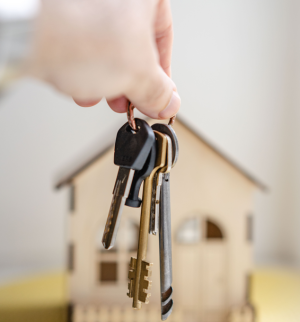Homebuyers beware! A couple lost $275,000 to an invoice scam after buying property
For many, owning their first home is a long-held dream. People work hard to save money so they can purchase their dream house.
But for some unlucky couples, this dream could become a nightmare if they find themselves scammed out of their hard-earned savings.
Such is the case for Simon Elvin and his wife, both of whom had spent 10 years saving to buy a property in the Blue Mountains in New South Wales.
They thought their dream of owning their first home had finally come true, especially when Mr Elvin received an email requesting a final payment of $274,311.57 for the purchase.
It also seemed to have all the right details included—the correct property address and matching conveyancer account details (including the Bank State Branch or BSB and account name).
Since the email seemed legitimate, the couple made the payment. Mr Elvin had to divide it into two separate transactions because the amount was too large to transfer in one.
However, the couple didn’t receive a confirmation email, and when Mr Elvin asked their conveyancer and real estate agent, they claimed they never received the payment.
When the real estate agent gave the couple the correct account details, doubt started to sink in.
‘I thought, “This account doesn't look the same as the last one. Maybe they've got two accounts”... the realisation that we had been scammed became quite clear,' Mr Elvin admitted.
He contacted his bank, Westpac, immediately. They then reached out to National Australia Bank (NAB), which was the bank of the scammer.
Unfortunately, a week had passed, and the couple’s money was almost gone by the time they realised it. The couple only got $270.72 back.
Mr Elvin believed the scammers had hacked into the conveyancer’s email to create the fraudulent invoice, that’s why the correct details of the home were included in the email they received.
Data from the Australian Competition and Consumer Commission’s (ACCC) Scamwatch showed invoice scams—particularly targeting big purchases like renovations, properties and cars—have been on the rise.
In the first nine months of 2023, Aussies reported 28,617 fraud billing scams, a 95 per cent increase from the same time period last year. Australians have collectively lost $23 million to false billing in the same time period.
Consumer advocates urge banks to launch a ‘confirmation of payee’ policy to help stop this scam.
Under the Bulk Electronic Clearing System (BECS), money transfers can be made even if the correct name was not used.
Consumer Action Law Centre Senior Policy Officer Tom Abourizk stated that banks do not check if the account name matches the account number even though both details were provided in the transfer.
Some banks have taken precautionary measures in their systems. This year, the Commonwealth Bank launched NameCheck—a policy that flags transfers with account details discrepancies.
Meanwhile, Westpac—who didn’t comment on the scam the Elvins experienced—said that they detect 60 per cent of scams: ‘When funds are unable to be retrieved, reimbursement is considered on a case-by-case basis with a range of factors taken into account.’
As for the couple, they settled their final payment on the house by taking out a lender’s mortgage insurance and increasing their mortgage. This cost them an extra $2,000 in monthly repayments.
So, what can you do to avoid being scammed? Customers are advised to call the company or person to verify their account details before paying. They can also use the PayID transfer system since it displays a bank account holder’s name.
Scamwatch stated that victims should immediately call their bank, report the scam to ACCC and provide the scammer’s profile name and details.

What do you think of this story, members? Do you have any good or bad experiences when it comes to home buying? Share them in the comments below!
But for some unlucky couples, this dream could become a nightmare if they find themselves scammed out of their hard-earned savings.
Such is the case for Simon Elvin and his wife, both of whom had spent 10 years saving to buy a property in the Blue Mountains in New South Wales.
They thought their dream of owning their first home had finally come true, especially when Mr Elvin received an email requesting a final payment of $274,311.57 for the purchase.
It also seemed to have all the right details included—the correct property address and matching conveyancer account details (including the Bank State Branch or BSB and account name).
Since the email seemed legitimate, the couple made the payment. Mr Elvin had to divide it into two separate transactions because the amount was too large to transfer in one.
However, the couple didn’t receive a confirmation email, and when Mr Elvin asked their conveyancer and real estate agent, they claimed they never received the payment.
When the real estate agent gave the couple the correct account details, doubt started to sink in.
‘I thought, “This account doesn't look the same as the last one. Maybe they've got two accounts”... the realisation that we had been scammed became quite clear,' Mr Elvin admitted.
He contacted his bank, Westpac, immediately. They then reached out to National Australia Bank (NAB), which was the bank of the scammer.
Unfortunately, a week had passed, and the couple’s money was almost gone by the time they realised it. The couple only got $270.72 back.
Mr Elvin believed the scammers had hacked into the conveyancer’s email to create the fraudulent invoice, that’s why the correct details of the home were included in the email they received.
Data from the Australian Competition and Consumer Commission’s (ACCC) Scamwatch showed invoice scams—particularly targeting big purchases like renovations, properties and cars—have been on the rise.
In the first nine months of 2023, Aussies reported 28,617 fraud billing scams, a 95 per cent increase from the same time period last year. Australians have collectively lost $23 million to false billing in the same time period.
Consumer advocates urge banks to launch a ‘confirmation of payee’ policy to help stop this scam.
Under the Bulk Electronic Clearing System (BECS), money transfers can be made even if the correct name was not used.
Consumer Action Law Centre Senior Policy Officer Tom Abourizk stated that banks do not check if the account name matches the account number even though both details were provided in the transfer.
Some banks have taken precautionary measures in their systems. This year, the Commonwealth Bank launched NameCheck—a policy that flags transfers with account details discrepancies.
Meanwhile, Westpac—who didn’t comment on the scam the Elvins experienced—said that they detect 60 per cent of scams: ‘When funds are unable to be retrieved, reimbursement is considered on a case-by-case basis with a range of factors taken into account.’
As for the couple, they settled their final payment on the house by taking out a lender’s mortgage insurance and increasing their mortgage. This cost them an extra $2,000 in monthly repayments.
So, what can you do to avoid being scammed? Customers are advised to call the company or person to verify their account details before paying. They can also use the PayID transfer system since it displays a bank account holder’s name.
Scamwatch stated that victims should immediately call their bank, report the scam to ACCC and provide the scammer’s profile name and details.
Key Takeaways
- A couple lost almost $275,000 to an invoice scam after purchasing their first home in the Blue Mountains, New South Wales.
- The husband, Simon Elvin, received an email appearing to come from his conveyancer requesting the final settlement payment. The account and BSB details matched those of his conveyancer.
- After not hearing from his conveyancer, Simon contacted them and discovered they had not received the payment. He contacted his bank immediately, but most of the money was lost.
- Invoice scams are rising in Australia, with $23 million lost between January and September this year, a 95 per cent increase compared to the previous year.
- Banks are urged to introduce a 'confirmation of payee' policy to prevent such scams.
What do you think of this story, members? Do you have any good or bad experiences when it comes to home buying? Share them in the comments below!








